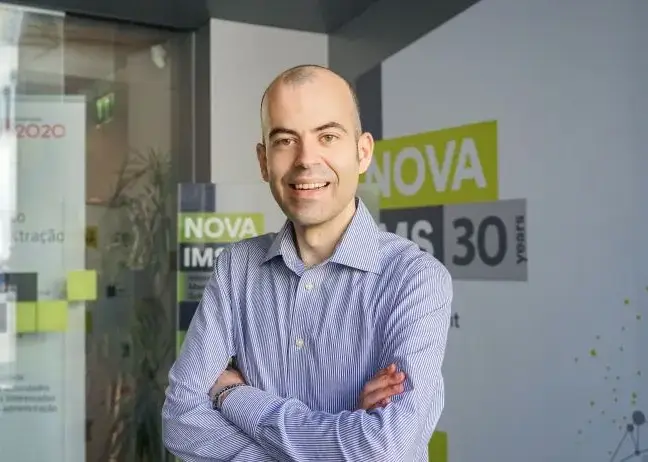Master practical skills for leading innovative digital change
Learn to plan and execute ethical digital innovation strategies
To join this module, learners must have completed the Digital Transformation module and accrued at least 30 ECTS. This module focuses on planning and executing digital innovation projects, using advanced models for text, image, audio, video, and data generation. Emphasis is placed on responsible development practices and ethical considerations in synthetic media, ensuring learners are equipped to handle modern digital challenges responsibly.
Key Details
This fully online course uses innovative teaching methods for the digital transformation project. It combines synchronous lectures, asynchronous individual study, and lab activities. Expert tutors guide students through problem-based learning, gamification, and flipped classroom approaches. Emerging technologies, such as artificial intelligence, enhance the learning experience.
Students will develop a digital transformation proposal and produce a comprehensive research report, supported by a software artefact. Assessments are ongoing, with the proposal accounting for 30% and the final report and artefact for 70% of the total grade. This structure ensures a deep understanding and practical application of digital transformation strategies.
Time commitment
Classroom and demonstrations: 12 hours
Practical work/tutorials: 12 hours
Independent learning: 226 hours
Total: 250 hours
Credit points
10 ECTS
Subjects covered
The Digital Transformation Project / Practicum is a 10 ECTS module delivered over 2 hours per week for 12 weeks with a significant component of independent study. The schedule of topics to be addressed each week is outlined below:
- Introduction and Project Proposal Development
- Overview of module objectives, expectations, and project proposal guidelines.
- Research Methodologies
- Techniques for conducting a literature review and selecting appropriate research methodologies.
- Project Management for Digital Projects
- Applying principles from “Risk & Change Management in Digital Environments” to plan digital projects.
- Ethical Considerations and Sustainability in Digital Projects
- Insights from “Data Governance and Ethics” on incorporating ethical practices and sustainability.
5-8. Core Area Integration into Practicum Development
- Integration of the core area of specialisation into project development. Namely: Data Science for Business, AI for Business, Cybersecurity for Business, and/or Cloud Computing for Business.
9. Project Development Workshop
-
- Hands-on session to develop and refine projects with peer and instructor feedback
10. Project Presentation and Communication Skills- Enhancing communication skills for presenting complex projects.
11. Project Evaluation and Reflection
Evaluating projects based on set criteria and reflecting on learning outcomes and future research directions
12. Project Showcase and Viva- Final presentation of projects to an audience, including a viva voce examination.
- Enhancing communication skills for presenting complex projects.
- Hands-on session to develop and refine projects with peer and instructor feedback
Learning objectives
After successfully completing this specialised practical project module, learners will be able to:
- Synthesise knowledge from core areas of the programme to propose, develop, and evaluate a significant digital transformation project for a specific industry or business.
- Apply project management principles to plan, execute, and deliver a practicum.
- Analyse the current state, identify opportunities for digital innovation, propose a transformation strategy, and outline the steps for implementation.
- Demonstrate professional communication skills by presenting and defending their project outcomes.
- Reflect on the ethical implications and sustainability of their project within a global and societal context.
Module leaders
Mauro Castelli, NOVA IMS.
Mauro received his bachelor’s and master’s degrees in Computer Science from the University of Milano Bicocca (Italy) in 2006 and 2008, respectively. He obtained a Ph.D. in Computer Science in February 2012 from the University of Milano Bicocca. Since October 2024, he has been a full professor at NOVA Information Management School, Universidade NOVA de Lisboa. Mauro has a vast international experience, he established a large international network of collaborations, and led several national and international projects, all receiving an excellent evaluation from the respective funding agencies. He is a researcher in the area of Machine Learning and Artificial Intelligence and, in 2022 and 2023, appeared in Stanford’s list of the World’s Top 2% scientists in the field of artificial intelligence. He supervised more than 130 master students and 9 PhD candidates. He published more than 130 journal papers and 60 in international conferences. Mauro is the director of the bachelor in Data Science at NOVA IMS, a member of the scientific council at NOVA IMS, and a member of the school council at NOVA IMS. He is also a member of the doctoral committee at the the University of Milano Bicocca. In the context of the Digital4Business program, Mauro designed and developed the Generative AI module and co-developed the Data Science for Business module.

Gain practical skills and knowledge for a thriving digital career
This project will equip learners with practical experience and advanced knowledge in digital transformation, essential for a successful digital career.
By working on real-world projects, students develop critical skills in problem-solving, project management and the application of emerging technologies like artificial intelligence.
The diverse expertise of industry and academic supervisors provides comprehensive guidance, preparing students for leadership roles in the fast-evolving digital landscape.
Our Programme
A crucial part of the Digital4Business network
The Digital Transformation Project is a vital component of the EU-funded Digital4Business programme, an innovative online master’s course. It aims to develop future digital leaders and strategists by examining how digital transformation fuels business innovation and efficiency. This programme equips students with the cutting-edge expertise required to thrive and lead in the evolving digital landscape.
 Your Resources Hub
Your Resources Hub
We’ve gathered all the essential resources you’ll need to navigate your Master’s journey. Whether you’re looking for an overview of the course structure, key dates or detailed programme information, it’s all here for you.
FAQs
Relevant EQF Level 6 qualification required in a relevant field including but not limited to: computer science, IT, engineering, maths, business, or economics. Without this you will have an interview and assessment to evaluate certifications, qualifications or professional experience.
Minimum B2 English proficiency, plus 2 years’ work or education in an English-speaking environment. IELTS: 6.0; TOEFL PBT: 600; TOEFL CBT: 200; TOEFL iBT: 100. Alternatively, proficiency may be assessed via a test or interview
This EU co-funded programme is open to all EU27, EEA, UK and Ukrainian nationals with a passport or valid ID from one of these countries.









)